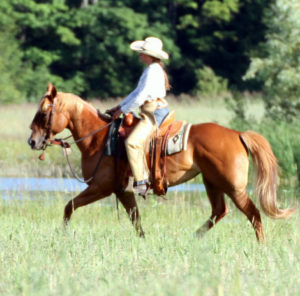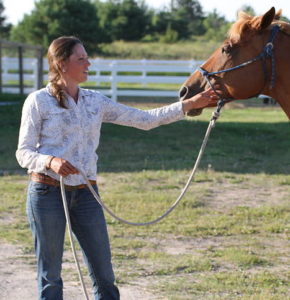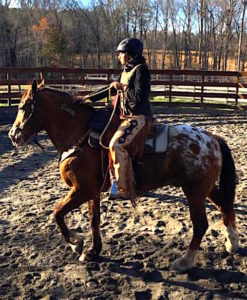Editor’s Note: Amy Skinner is a regular guest columnist and has been a horse gal since age six. She works with owner/operator Jim Thomas as a trainer at Bar T Horsemanship where she rides and teaches English and Western. She also maintains Essence Horsemanship. Skinner has studied at the Royal Andalusian School of Equestrian Art in Spain, with Buck  Brannaman, Leslie Desmond, Brent Graef, and many others.
Brannaman, Leslie Desmond, Brent Graef, and many others.
Meet Skinner and Thomas at the Best Horse Practices Summit
Here, Skinner shares some notes on horses and riders.
Skinner writes:
Ray Hunt said, “The first time you ride a horse, he’ll cost you money. The second time he’ll hold his own. The third ride, he’s on the payroll.”
Over the years, I’ve thought a lot about this process. It has a different meaning to me now than it did years ago. The young horses I started always came up with some resistance to my leg or rein or body aids during the first week of riding, and I always figured they needed more time to sort things out.
This month, as I start a group of young horses at the Bar T, I’ve had a bit of an epiphany:

Amy Skinner
Before riding them, all the work I did with them on the ground was directly related to riding. I asked them to carry themselves a certain way. I looked for lightness and relaxation with my cues.
Beyond these requirements, I also asked the horse to play a part. In other words, I’d ask myself, “How can I get this horse not simply to accept what I’m doing, but to be a part of it?
- When I caught a horse, I asked it to participate by facing up, lowering its head, softening its poll, and tipping its head toward me. I would want it to find those movements through relaxation and learn to get in these habits without my forcing it.
- When saddling, I stopped going around the horse to get to the cinches. Instead, I moved the horse around me, moving the shoulders around the front end and putting itself in place for me to cinch it up.
- I asked my horses to lead up to a block, fence, or wherever I was standing for mounting. I most definitely asked horses to stay still when I mounted and dismounted.
- I asked the horses to find relaxation in whatever I was asking and to participate rather than tolerate.
 What were the results to my new approach?
What were the results to my new approach?
- Better first rides with less trouble and fear for both of us.
- A better connection between what I’d taught on the ground and what I was asking for under saddle.
- A working horse in fewer rides.
My group of colts right now are on their second and third rides. They are walking through water, going out on the trail, opening fences, and loading cows up onto a trailer.
I believe the reason these colts are so handy and relaxed is because they’ve been contributing since Day 1. Everything we did under saddle was just the next thing from what they’d already been doing on the ground. It wasn’t a shock or big change from their pre-riding life to going under saddle.
I think of bosses I’ve had. In jobs where bosses told me what to do, I complied because my paycheck depended on it. I did what I was asked, nothing more.
In jobs where my bosses asked me to participate and treated me like a work partner, I felt valued and offered more. I noticed things that needed to be done and did them without being asked. I was part of the whole, not just someone being directed and waiting to get done and go home.
I believe horses feel the same. At the risk of humanizing the horse, I feel that when horses who are asked to take part and have jobs, they have pride in their work. I see this when my colts get confident after moving a cow, or ponying another horse, or opening a gate. They know they contributed to something and feel confident about their ability.
I feel sad for horses who just get ridden around in arenas, show pens, and trails where they are just told to perform, go, stop, and turn. I hear people blame their horses regularly, but to me it sounds like excuses for poor horsemanship:
“He’s too much of a baby to do that.”
“My horse hates water, he’d never go through that.”
“That’s all well and good on a gelding, but try doing that with a mare.”
“Oh but he’s an Arab/Warmblood/Showhorse/donkey/mule…”
When riders insult their horses, what they’re really saying is that they as riders are too afraid, ignorant, or unwilling to change. Horses need to be respected as intelligent beings with a lot to offer.
So who is the freeloader? You or your horse? As my teacher Alicia Byberg said, “Pet your horse and slap yourself.” I still haven’t heard better advice to this day.
A lot of wisdom and insight in this article. Two living beings of different species working together and communicating in a real partnership with contribution from both.
Once again you say a lot in a short article.. Very nice job
Thought provoking article, thank you.
I find I have to keep remembering and refining this. It is easy for me to let small things slide so I can get to the riding part. Taking the time to notice and play with all these small things on the ground has made a Big difference in how my mare feels about things and it shows up in the riding. Thanks for the reminder!
So well said Amy and so true.
Whenever I go to a Hunter/Jumper show sadly enough I see most horses being forced into the relationship with the rider by devices, drugs and draw reins. The rare acception is the soft and balanced horse moving in harmony and rhythm with its rider in softness and Center Balance. The worst part is that most of the trainers don’t know or care to understand the difference and therefore cannot even begin to teach it.
Thanks for always standing up for the horse and doing right by them….you are a rare creature in the Trainer’s world
I just read Amy Skinners post re what horse people call their horses such as lazy etc. I have had difficulty with the description of horse behavior using the word respect. I understand the meaning reason behind this but somehow the word does not describe the behavior. Does Amy or you have a better word or is it a series of words to describe the behavior we want such as space, Looking for a better way to talk & THINK ABOUT the human word respect that in itself has so many meanings & connotations & even in horse circles.
Thank you
Hi Carole, Amy Skinner relayed this response:
Carole, I think you’re right, respect is not an accurate word for horses. I think it makes explaining easy for people because we think in those terms, but horses don’t know respect and disrespect, only what works. I have been also wondering what a better word is but so far I can only come up with responsiveness. A horse many people think of as disrespectful is just responding to how It is taught and handled and what is expected. I would love to hear from others their thoughts on a better word. Thanks for the thoughtful comment
You inspired me to approach my horses much different. Thank you.